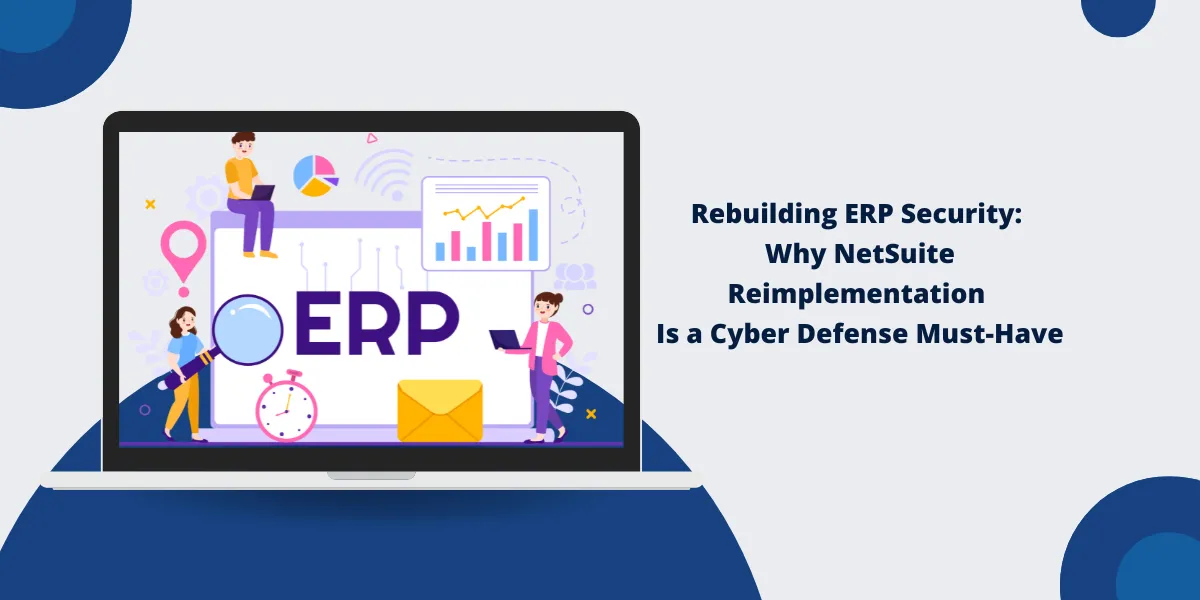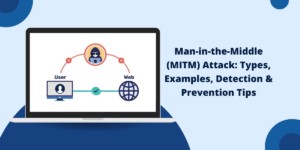If your business uses NetSuite, you’re probably aware of its many benefits. It helps manage everything from financials and customer relations to inventory and employee data. But what most people don’t think about is how vulnerable NetSuite can be if it isn’t properly secured. Over time, systems can accumulate security gaps, outdated integrations, and unmonitored access permissions, making it increasingly prone to threats. Without addressing these issues, your business is at risk.
NetSuite is the heart of many businesses, and like any system that holds sensitive information, it’s a prime target for cybercriminals. Unfortunately, if your system is outdated or poorly configured, it could be exposing your company to huge risks, including data breaches, financial losses, and damage to your reputation. Hackers often look for weak spots in systems they know are vital to an organization’s operations, making NetSuite a prime target.
In this article, we’ll explain why a NetSuite reimplementation — not just a quick update — is essential for improving your system’s security and safeguarding your business from modern cyber threats. We’ll break down why this process is crucial, what it involves, and how to get started on a more secure ERP future. You’ll learn how reimplementing your system can offer better protection and ensure your data stays secure in the long run.
Why Are ERP Systems Prime Targets for Hackers?
Think about the core functions of your NetSuite system. It tracks your financials, manages payroll and HR information, holds customer data, stores inventory levels, and more. In other words, it holds everything that matters to your business. If a hacker gains access to your ERP system, they essentially have control over your entire organization. This makes your system an incredibly tempting target.
But there’s another reason ERP systems like NetSuite are such common targets: complexity. ERP systems are often customized to fit the unique needs of each business, which makes them harder to secure. Over time, businesses may:
- Grant too much access to users: When NetSuite was first set up, the permissions might have been clear and limited. However, over time, more users get added with broader access. Employees who no longer need access to certain parts of the system may still have open access, leaving your data exposed.
- Integrate old third-party apps: Companies often rely on third-party applications to connect to their ERP systems. While this makes business processes easier, those apps can introduce vulnerabilities if they’re outdated or not configured with security in mind.
- Neglect monitoring and audits: Many companies fail to routinely check activity logs or review user permissions, leaving critical gaps in security. Without consistent oversight, it becomes difficult to spot anomalies, making it easier for hackers or internal threats to go unnoticed.
These weaknesses put your system at serious risk, and if your NetSuite system hasn’t been re-implemented or audited recently, it may be vulnerable to modern cyber threats.
What Is NetSuite Reimplementation?
So, what does NetSuite reimplementation actually mean? It’s more than just running an update or patching your system. Reimplementation is the process of rebuilding your NetSuite system from the ground up. Instead of just slapping on a few security updates, you’re designing a more secure and optimized system based on the latest cybersecurity best practices.
Here’s what goes into NetSuite reimplementation:
- Data cleanup and reorganization: Over the years, your data may become disorganized. Old records might clutter your system, or sensitive data could be stored in places that aren’t secure. Reimplementation involves cleaning up and reorganizing data to ensure it’s stored correctly, securely, and in compliance with relevant regulations.
- Role-based access control (RBAC): One of the most crucial aspects of security is ensuring the right people have access to the right data. NetSuite allows you to define permissions for each role in the system, meaning employees only have access to the data necessary for their specific job function. This minimizes the chance of unauthorized access or accidental data breaches.
- Eliminating unnecessary integrations: Over time, your NetSuite system may have been connected to third-party applications that are now outdated or unnecessary. Reimplementation is the perfect opportunity to review these integrations, remove any that are no longer needed, and ensure that the remaining ones are secure and updated with modern cybersecurity standards.
- Enhanced authentication and security protocols: With reimplementation, you can implement stronger security measures, like two-factor authentication (2FA) and modern encryption methods. These tools can add layers of protection to prevent unauthorized access and keep your system safe from cyberattacks.
In short, NetSuite reimplementation is a comprehensive rebuild that brings your system up to modern standards, helping to close any security gaps and streamline your operations.
How Does Reimplementation Improve Cybersecurity?
Now that we know what reimplementation is, let’s take a closer look at how it can dramatically improve the cybersecurity of your NetSuite system.
1. Tighter Access Control
Access control is one of the first things that needs to be addressed during reimplementation. Role-based access allows you to specify exactly what each user can see and do within the system. This ensures that employees only have access to the data they need to do their job, preventing data exposure and internal threats.
For example, an accountant should have access to financial records but not HR data, while HR should be able to view employee information but not customer billing details. By rethinking how user roles are assigned and making them more restrictive, you can significantly reduce the risk of unauthorized access.
2. Secure Third-Party Integrations
As mentioned earlier, NetSuite often integrates with third-party apps — like CRM tools, accounting software, and supply chain management systems. While these integrations are necessary for business operations, they can also create security vulnerabilities if they are outdated or improperly configured.
Reimplementation gives you the chance to review and assess each integration. Outdated, insecure, or unused integrations can be removed, and the ones that are still necessary can be updated with the latest security protocols. For instance, ensuring that these third-party applications have the latest encryption standards and security measures can help prevent hackers from exploiting weaknesses.
3. Better Monitoring and Reporting
Another critical component of cybersecurity is monitoring system activity. During reimplementation, you can set up audit logs to track every action performed within the system. This includes logging who accessed what data, when, and what changes were made. These logs create a clear trail that can be reviewed in case of suspicious activity.
Moreover, reimplementation also allows you to set up alerts for unusual activities — such as large data exports or unauthorized login attempts — so that your team can quickly act to mitigate potential security risks.
4. Compliance-Ready Setup
Compliance with data protection regulations is not just a best practice; it’s often a legal requirement. Whether your company is subject to GDPR, HIPAA, or SOC 2, reimplementation helps ensure that your NetSuite system complies with these standards. It ensures that sensitive customer and employee data is properly protected and that you’re following industry-specific security guidelines.
Why Use a NetSuite Reimplementation Consultant?
While reimplementation is a powerful way to secure your NetSuite system, it’s also a complex process. That’s why working with an experienced NetSuite reimplementation consultant can be incredibly helpful. These consultants bring a wealth of expertise and can help guide the entire process from start to finish.
Here’s how a consultant can assist:
- Audit your current setup: A consultant can thoroughly review your existing NetSuite system, identify any vulnerabilities, and help prioritize what needs to be addressed during reimplementation.
- Design a secure system: With their deep knowledge of security best practices, they can design a NetSuite system that is both secure and optimized for your business’s needs.
- Handle the technical heavy lifting: Reimplementation requires technical expertise, especially when it comes to custom configurations and integrations. Consultants handle the nitty-gritty details to ensure everything is done right.
- Train your team: Reimplementation isn’t just about securing the system; it’s also about ensuring that your employees use it securely. Consultants can train your team on how to use the updated system and best practices to prevent security issues.
What Should You Do Next?
If you’re ready to improve your NetSuite security, here are some key steps to take:
- Get a Security Audit: Have a consultant review your current setup to identify vulnerabilities.
- Define Your Security Needs: Based on the audit, prioritize what needs to be changed to strengthen your security.
- Plan a Reimplementation Project: Work with experts to outline a plan for rebuilding your NetSuite system.
- Work with Experts: Don’t try to do this alone. A qualified consultant can help guide you through the entire reimplementation process.
Final Thoughts
Your NetSuite system is a critical part of your business, and protecting it is not optional. Cyberattacks are becoming more frequent and sophisticated, so it’s essential to ensure that your system is prepared to handle modern threats.
NetSuite reimplementation is a proactive and essential step in keeping your system secure, efficient, and compliant. Don’t wait for a security breach to take action — reach out to experienced NetSuite reimplementation consultants and take the first step toward a safer future for your business today.

Priya Mervana
 Verified Web Security Experts
Verified Web Security Experts
Priya Mervana is working at SSLInsights.com as a web security expert with over 10 years of experience writing about encryption, SSL certificates, and online privacy. She aims to make complex security topics easily understandable for everyday internet users.



